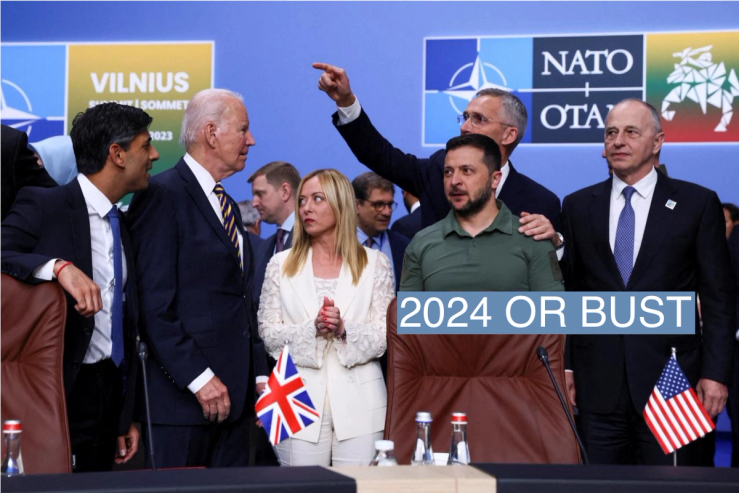The Authors
Jaap de Hoop Scheffer was NATO Secretary-General from 2004 to 2009. Ivo Daalder was the United States’ Permanent Representative to NATO from 2009 to 2013. Stefano Stefanini was Italy’s Permanent Representative to NATO from 2007 to 2010.
In this article:
The Argument
The NATO summit in Vilnius last week advanced Ukraine’s goal to be inextricably tied to the West. Next year’s summit in Washington, D.C., is the right time to solidify this goal by extending an invitation to Kyiv to join an alliance that for 75 years has kept its members safe, free, and at peace. Ukraine deserves no less.
The Column
Ukraine may not have received an invitation to join NATO last week, but it did get an important promise from allied leaders: Ukraine will be the alliance’s 33rd member. NATO now needs to put in place a strategy that delivers on that promise, for its own credibility and for Kyiv’s ultimate security.
An invitation to join NATO in Vilnius was never on the cards, no matter how much Ukraine’s President Volodymyr Zelenskyy pressed for one. So long as war rages, Ukrainian membership in NATO would make its members an active party to the conflict — something each one of them has sought to avoid since Russia’s full-scale invasion.
But allied leaders did make it clear that Ukraine’s membership is no longer in question. That train has left the station. The best option to get it to its destination will be to extend an invitation to join by the time they meet again next year.
NATO must address the central issue it avoided in Vilnius: how to bring into the alliance a country that is at war with its neighbor, whose borders are contested, and that has foreign forces occupying parts of its territory. It must use its invitation both to de-escalate the war and to ensure that Ukraine’s security depends on NATO’s deterrence.
However successful, Ukraine’s counteroffensive is unlikely to change these realities, even if it succeeds in reconquering more of the territory Russia currently controls. And once the counteroffensive has concluded, both Ukraine and Russia will be exhausted — and likely unable to go on the attack for months, if not years, to come.
This, then, is the time for opening some forms of talks targeting a temporary ceasefire or even an armistice. Actual peace negotiations aren’t likely, since both Moscow and Kyiv wish to control Ukraine’s territory, including Crimea, which Russia illegally annexed in 2014. But halting or limiting fighting in a localized way (much as it was prior to Russia’s full-scale invasion last year) may well be in the interest of both sides.
In that window of opportunity, both countries need to be convinced that a resumption of fighting, or its expansion beyond the limited areas along the frontline, will not serve their interests.
For Kyiv, the incentive will be NATO membership. By issuing a formal invitation to Ukraine, alliance leaders will give Kyiv something it desperately wants. In return, Ukraine would agree to seek recovery of its territory still occupied by Russia through diplomatic and political, rather than military, means.
This would hardly be the first time a nation has decided not to retake territory by force: Japan has not done so for more than 75 years with respect to its northern territories; West Germany never abandoned the hope for reunification with the East but foreswore the use of force to do so. Yet, both countries were given tangible security guarantees (bilateral in Japan’s case; through NATO in West Germany’s).
For Moscow, a NATO invitation to Kyiv would make clear that continuation of the war will not prevent Ukraine from joining NATO. To fill the security gap between invitation and actual membership, major NATO allies (including at minimum the U.S., Britain, France, Germany, Italy, and Poland) would accompany the formal invitation to join NATO with bilateral security guarantees, much like they did for Finland and Sweden once these nations decided to join NATO last year.
These guarantees would explicitly extend only to those territories controlled and administered by Ukraine, and not to those occupied by Russia. And Kyiv would have to make clear that it would forgo military actions against Russian forces that might lead to retaliation against the territories Ukraine controlled and administered.
While Russia might test the credibility of these bilateral security guarantees, it would have to do so at the risk of involving the U.S. and other major allies directly into the conflict — a prospect that historically has deterred Moscow.
Neither U.S. President Joe Biden nor other NATO leaders have so far been willing to extend such direct security guarantees. The fear of escalation has outweighed their faith in deterrence. But once the conflict reaches a stalemate — or, better still, a ceasefire — deterrence, via bilateral guarantees until full NATO membership kicks in, can prevent the full-scale resumption of war. So long as Russia doesn’t attack Ukrainian-held territory beyond the immediate line of confrontation, none of Kyiv’s security guarantors would engage directly in any fighting.
NATO countries will also need to make clear that they will proceed with an invitation regardless of Moscow’s views. Those who advocate extending membership to Ukraine only “after the war” or “once hostilities end” in effect are suggesting that Russia can veto an invitation by continuing the war.
Offering Ukraine membership to NATO will not, as Russian President Vladimir Putin likes to claim, increase tensions. It will reduce them. Alliance leaders must work towards this goal immediately. It is what Ukraine deserves.
Notable
- The Vilnius summit showcased a growing realignment within NATO, with European nations exhibiting greater assertiveness, and the U.S. proceeding more cautiously, according to The Wall Street Journal’s chief foreign-affairs correspondent.

